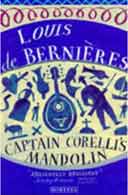THE BLUE BEDSPREAD by RAJ KAMAL JHA
A very quick read, in an experimental minimalist style, mining the territory opened up by Arundhati Roy–incest and familial sexual abuse. Do these things really happen in India? I remember the shock I felt as an 18 year old when a maid working for one of the leading and pious Catholic families in town, told me her employer regularly pawed and propositioned her. What? How could it be? I thought in shock and revulsion.
“The Blue Bedspread” is a self-conscious novel, of course, though written in the clear, transparent style that conceals art. The story is told in a series of Faulknerian flashbacks. The tension and sadness build relentlessly. I read it quickly, and it maintained my interest throughout. If you are interested in style, and experimentation with it, and in unusual novels, which are, nevertheless, a quick read, this slim novel will probably be worth your while.
![]() Bookmark this on Delicious
Bookmark this on Delicious
Captain Corelli’s Mandolin
Captain Corelli’s Mandolin
It’s so much easier and quicker to watch the movie than read the book I land up watching the film version of many books I have wanted to read. I enjoyed Captain Corelli’s Mandolin, the movie. I knew nothing of the German massacre of the Italian troops, or the Italian occupation of Greece (It’s been decades since A level history!) so I spent an enjoyable half hour on the net afterwards filling in my historical gaps.
The novel sounds really interesting. I love polyphonic novels, likeSound and Fury and piecing together a complete picture from the fragments of things people say, a bit like listening to gossip. I look forward to reading it. Here’s a tantalizing review.
The different sounds of the mandolin

Thinking of “Madame Bovary,” by Gustave Flaubert.
I read “The Necklace” by Guy de Maupassant today, http://thegoodbooksblog.blogspot.com/2010/08/necklace-by-guy-de-maupassant.html very sad though brilliantly constructed, and it reminded me of Madame Bovary.
“Madame Bovary” is exquisite, it is perfection, and it is also exquisitely painful. I do not think I will ever read it again. It is so perfectly rendered a work of fiction that it breaks the heart.
Emma Bovary is a silly woman of imaginations and pretensions. She marries a simple plodding doctor who thinks she is the best thing to have happened to him. He adores her; she is bored by him.
The tragedy of the novel is that Emma seeks love, acceptance and romance from trivial, undeserving men, when all this lies at hand for her in her accepting, adoring husband.
She carries on expensive flirtations, sinking further and further in debt. When her debts seems overwhelming, she swallows arsenic.
Charles, the true hero of the book, lives on in the happy memory of his wife. He is, in a sense, the happiest, only satisfied character in the book, for he believed he had what he coveted, Emma’s love. After Emma’s death, everyone cheats him, claiming debts that Emma hadn’t in fact taken on. He overworks, his child gets ragged. When Emma’s perfidy is revealed, he dies of a broken heart. Her good daughter, Berthe, is sent to work in a factory.
Meanwhile, as a foil to the good honest doctor, there is a devious, scheming apotechary Monsieur Homais, who rises in the world even as the Emma falls. Finally, crowning injury, as Berthe grows more ragged, the Homais’ forbid their children to play with her.
It is in the verisimilitude of tiny details like that that Flaubert creates an absolutely memorable, absolutely believable book. No suspension of disbelief necessary. It could just as easily be a work of non-fiction so perfect are its details and characterization. In fact, Flaubert based his novel on a newspaper account of a silly provincial housewife–but, famously, and interestingly for a man of discipline as he undoubtedly was, he wrote, “Madame Bovary, c’est moi.”
The Necklace by Guy de Maupassant
Here’s another perfectly constructed, economical, heart-breaking story my father had told me as a teen, and which I’ve just read for myself this week.
